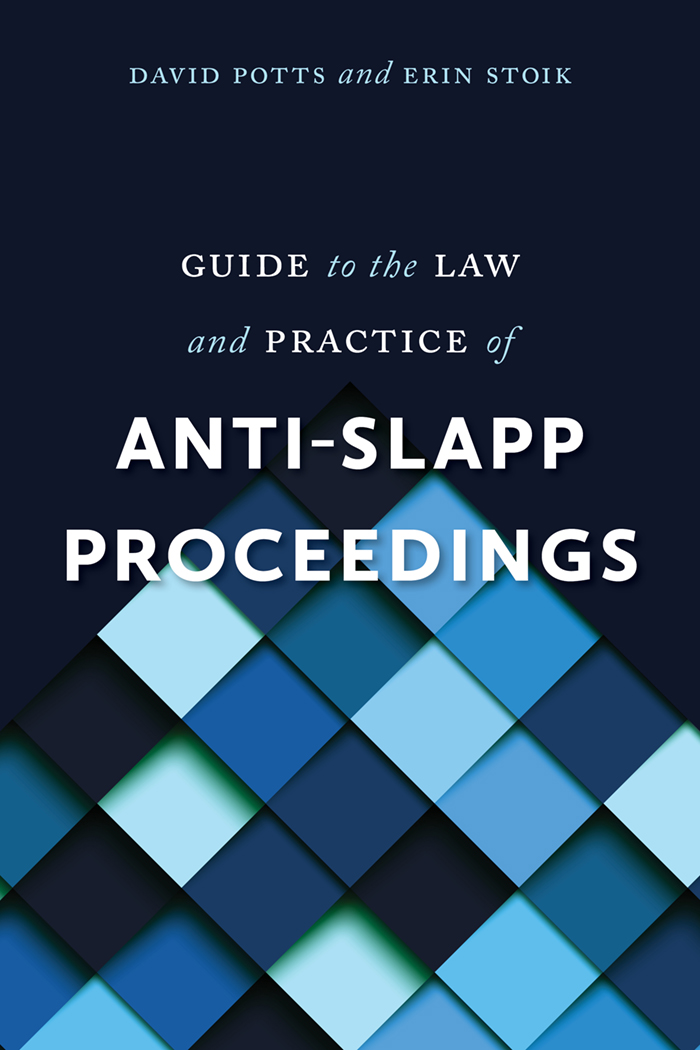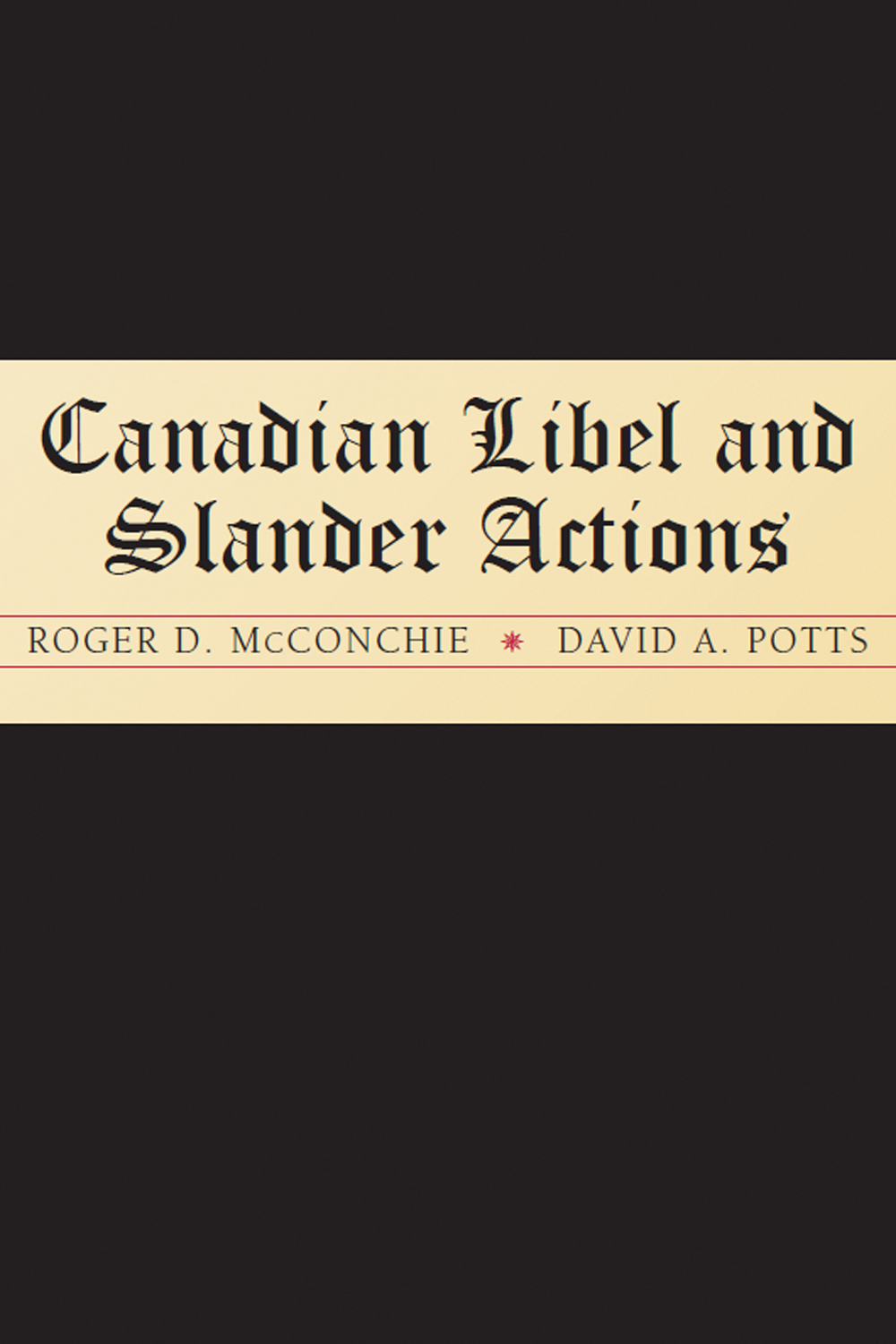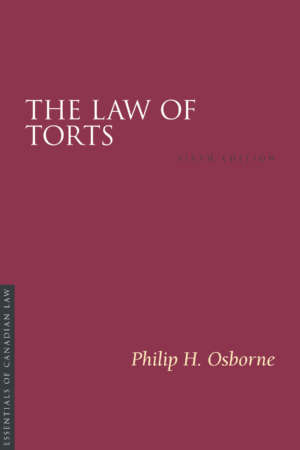Product Description
The anti-SLAPP legislation, more formally known as section 137.1 of the Courts of Justice Act in Ontario and the Protection of Public Participation Act in British Columbia, is arguably the most influential development in Canadian defamation law in the last fifty years, aside from the advent of the internet.
It appears simple in theory. It is not simple in practice.
It was intended to be straightforward, swift, and inexpensive. It has become protracted, complex, and costly.
Written primarily for judges and lawyers in Ontario and British Columbia who are faced with anti-SLAPP proceedings, this text presents a detailed and comprehensive analysis of anti-SLAPP legislation and proceedings.
Dedication to the Honourable Dennis Lane QC
Acknowledgements
Preface
Part I: Background and Context
Chapter 1: Introduction
Chapter 2: Summary of Defamation Law
Chapter 3: Libel and Defamation in the Age of the Internet
Chapter 4: Campaigns of Vilification and Defamation
Chapter 5: Defamation Damages
Chapter 6: Contempt of Court Proceedings
Part II: The Legislation and Its Objectives
Chapter 7: Legislative Background to Anti-SLAPP Proceedings
Chapter 8: Statutory Interpretation of the Legislation
Chapter 9: Judicial Screening
Chapter 10: Objectives of the Legislation
Part III: Preliminary Considerations
Chapter 11: Jurisdiction
Chapter 12: Forms of Expression and Platforms of Publication
Part IV: The Threshold Burden on the Defendant: Section 137.1(3)
Chapter 13: Public Interest: Legislation and Caselaw
Chapter 14: Matters Related to the Public Interest — Section 137.1(3)
Part V: The Merits Hurdle: Section 137.1(4)(a)
Chapter 15: Legislation and Caselaw
Chapter 16: The Claim Must Have Substantial Merit
Chapter 17: No Valid Defence — Section 137.1(4)(a)(ii)
Chapter 18: The Defence of Justification
Chapter 19: The Defence of Fair Comment
Chapter 20: The Defence of Qualified Privilege
Chapter 21: The Defence of Responsible Communication
Chapter 22: Malice
Part VI: The Public Interest Hurdle: Section 137.1(4)(b)
Chapter 23: Proof of Harm in Anti-SLAPP Proceedings: General Principles
Chapter 24: Detailed Examination of the Factors
Chapter 25: Evidence of Harm: Financial, Reputational, Emotional
Chapter 26: Causation of Harm
Chapter 27: Actions That Proceeded to Trial and Actions That Were Dismissed
Chapter 28: Determining Whether a Proceeding Is a SLAPP Action
Chapter 29: The Weighing of Public Interest
Part VII: Costs and Damages
Chapter 30: Costs on Dismissal of Proceedings: Section 137.1(7)
Chapter 31: Costs if Motion to Dismiss Is Denied: Section 137.1(8)
Chapter 32: Leave to Appeal Costs
Chapter 33: Damages — Section 137.1(9)
Chapter 34: British Columbia Decisions on Costs
Part VIII: Procedural Rules
Chapter 35: Introduction to Procedural Matters
Chapter 36: No Further Steps in Proceeding — Section 137.1(5)
Chapter 37: No Amendment to Pleadings — Section 137.1(6)
Chapter 38: Commencement of an Anti-SLAPP Motion — Section 137.2(1)
Chapter 39: Motion to Be Heard Within Sixty Days — Section 137.2(2)
Chapter 40: Cross-Examination — Section 137.2(4)–(5)
Part IX: Procedural Issues in Anti-SLAPP Motions
Chapter 41: Applicability of Libel Notice
Chapter 42: Intervenors in Anti-SLAPP Proceedings
Chapter 43: Apologies and Retractions
Chapter 44: Publication Bans
List of Cases: The Moving Party in an Anti-SLAPP Motion
List of Cases: Proceedings in which Anti-SLAPP Motions Have Been Brought
List of Cases: The Merits Hurdle and the Public Interest Hurdle 478
Annotated Bibliography on Information Warfare
Table of Cases
Index
About the Authors
“Our landscape in libel has been turned upside down by SLAPP motions. As counsel, you’re going to face one of these motions in a libel action if it involves a public issue. This text is invaluable. If you are plunged into the swamp this is your rope out. It covers every possible issue. A bible for the plaintiff or defendant. It is a text of accuracy and comfort for the barrister.”
—Julian Porter, QC
“David Potts & Erin Stoik’s Guide to the Law and Practice of Anti-SLAPP Proceedings is an essential tool for any lawyer or judge involved in an anti-SLAPP motion. The guide impressively also provides a comprehensive summary of the substantive law of defamation as it might arise in these kinds of motions. In many cases the guide will be a one-stop resource for counsel. Given the complexity of the law on these motions, the guide will also be a valuable resource to judges to assist them in applying the proper legal principles and tests in rendering their decisions.”
—Howard Winkler
Winkler Law: Media & Defamation Lawyers
“Defamation law experts David Potts and Erin Stoik have done our profession a great service by writing the comprehensive text Guide to the Law and Practice of Anti-SLAPP Proceedings. The recently proclaimed anti-SLAPP legislation in the Ontario Court of Justice and the British Columbia Protection of Public Participation Act are the most notable developments in defamation law in the past twenty years. Their text is extremely instructive and practical. It is the seminal legal guide for Canadian lawyers and judges who grapple with anti-SLAPP issues. Both David and Erin should be congratulated for demystifying this complex area of the law. This area of the law can be easily assimilated by accessing their text. Quite simply, the Guide to the Law and Practice of Anti-SLAPP Proceedings is a must read for all civil lawyers and courts.”
—The Honourable Todd L. Archibald
Retired Justice of the Ontario Superior Court of Justice
Editor of Advocates Quarterly and Annual Review of Civil Litigation; co-author of Ontario Superior Court Practice: Annotated Rules & Legislation, Profiting from Risk Management and Corporate Compliance, and The Trial Book
“Strategic Lawsuits Against Public Participation are not a new phenomenon but, it seems, they are becoming increasingly prevalent. Evidence from governments, journalists, NGOs, and academics, amongst others, suggests that SLAPP litigation is being deployed by wealthy and influential individuals, and by large and powerful organisations, to shut down critical and potentially vitally important public interest speech, not just in Canada, but around the world. However, part of the problem with effectively dealing with (and stopping) SLAPP litigation that is taxing governments, lawyers, and academics is identifying and understanding it. In turn, understanding SLAPPs helps to ensure that legitimate and meritorious claims in, for example, defamation, proceed, and that these claimants are not unfairly categorised as SLAPP litigants. This comprehensive, rigorously researched, and accessible book will help any reader to achieve this understanding. It is, in my view, an indispensable guide for lawyers involved in SLAPP litigation, that I think will also serve as a reference point for lawyers, policy makers, and academics in other jurisdictions who are seeking guidance on how to approach SLAPPs.”
—Dr Peter Coe
Lecturer in Law | Associate Research Fellow, Institute of Advanced Legal Studies and Information Law and Policy Centre, University of London | Editor-in-Chief, Communications Law | Associate Academic Member, East Anglian Chambers | Advisor, Online Harms and Cyber Crime Research Unit, University of East London | Independent member of the Council of Europe’s Expert Committee on Strategic Lawsuits Against Public Participation.
“This book by David Potts and Erin Stoik is an invaluable guide to the evolving law of defamation and anti-SLAPP litigation. These two superb experts have composed a comprehensive and insightful summary of defamation law in Canada, the impact of the Internet and the global nature of modern defamation practice, and the impact of anti-SLAPP legislation. The book is both a thorough treatise clearly explaining all relevant legal doctrines and principles, and a highly insightful practical lawyering guide to navigating strategy and tactics in this complex and evolving legal arena.”
—Rodney Smolla is President of the Vermont Law and Graduate School. He was previously President of Furman University, and Dean of the Delaware, Washington & Lee, and Richmond law schools. He is a well-known constitutional and media law scholar and litigator, who has argued in state and federal courts across the United States, including the United States Supreme Court, where he argued Virginia v. Black, dealing with the First Amendment standards applicable to hate speech and threats. He is the author of five legal treatises, including Law of Defamation, Smolla and Nimmer on Freedom of Speech, Federal Civil Rights Acts, Law of Lawyer Advertising, and Rights and Liabilities Right in Media Content Internet, Broadcast, and Print. He is also the author of many trade and university press books. His most recent book is Confessions of a Free Speech Lawyer: Charlottesville and the Politics of Hate (2020).



